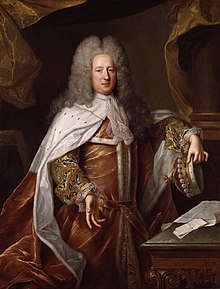
Back هنري ساينت جون، نبيل بولينغبروك Arabic هنرى ساينت جون ARZ Henry St John Catalan Henry St. John, 1. Viscount Bolingbroke German Χένρυ Μπόλινμπροκ Greek Henry St John, vizconde de Bolingbroke Spanish Henry St John (1er vicomte Bolingbroke) French Henry Saint-John Bolingbroke Italian ヘンリー・シンジョン (初代ボリングブルック子爵) Japanese Henry St. John, 1. Viscount Bolingbroke NDS
The Viscount Bolingbroke | |
|---|---|
 Henry St John, 1st Viscount Bolingbroke. Attributed to Alexis Simon Belle, c. 1712 (NPG 593 at the National Portrait Gallery, London). | |
| Secretary of State for the Southern Department | |
| In office 17 August 1713 – 31 August 1714 | |
| Monarchs | |
| Preceded by | The Earl of Dartmouth |
| Succeeded by | James Stanhope |
| Secretary of State for the Northern Department | |
| In office 21 September 1710 – 17 August 1713 | |
| Monarch | Anne |
| Preceded by | Henry Boyle |
| Succeeded by | William Bromley |
| Secretary at War | |
| In office 1704–1708 | |
| Monarch | Anne |
| Preceded by | George Clarke |
| Succeeded by | Robert Walpole |
| Jacobite Secretary of State | |
| In office July 1715 – March 1716 | |
| Monarch | James Francis Edward Stuart |
| Preceded by | Thomas Higgons |
| Succeeded by | John Erskine, Earl of Mar |
| Personal details | |
| Born | Henry St John 16 September 1678 Battersea, Surrey England |
| Died | 12 December 1751 (aged 73) Battersea, London, Great Britain |
| Political party | Tory |
| Spouses |
|
| Parents |
|
| Signature | |

Henry St John, 1st Viscount Bolingbroke (/ˈsɪndʒɪn ˈbɒlɪŋbrʊk/; 16 September 1678 – 12 December 1751) was an English politician, government official and political philosopher. He was a leader of the Tories, and supported the Church of England politically despite his antireligious views and opposition to theology.[1][2][3][4][5] He supported the Jacobite rebellion of 1715 which sought to overthrow the new king George I. Escaping to France he became foreign minister for James Francis Edward Stuart. He was attainted for treason, but reversed course and was allowed to return to England in 1723. According to Ruth Mack, "Bolingbroke is best known for his party politics, including the ideological history he disseminated in The Craftsman (1726–1735) by adopting the formerly Whig theory of the Ancient Constitution and giving it new life as an anti-Walpole Tory principle."[6]
- ^ See e.g., Henry St. John Viscount Bolingbroke, "Letters or Essays Addressed to Alexander Pope: Introduction", The Works of Lord Bolingbroke: With a Life, Prepared Expressly for This Edition, Containing Additional Information Relative to His Personal and Public Character, (Philadelphia: Carey and Hart, 1841) Vol 3, pp. 40–64. Also available on Project Gutenberg as "Letter to Alexander Pope" in Letters to Sir William Windham and Mr. Pope.
- ^ D'Holbach, Baron. Good Sense paragraph 206
- ^ The philosophical works of Lord Bolingbroke Volume 2, p. 287
- ^ Allen, Brooke, Moral Minority p. 75
- ^ Voltaire, God and Human Beings pp. 64, 80, 104
- ^ Ruth Mack (2009). Literary Historicity: Literature and Historical Experience in Eighteenth-century Britain. Stanford UP. p. 8. ISBN 9780804759113.
© MMXXIII Rich X Search. We shall prevail. All rights reserved. Rich X Search